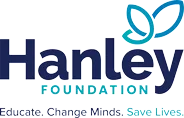Powered by RedCircle
Welcome back to The Hanley Effect, Hanley Foundation’s podcast, with CEO, Dr. Rachel Docekal and Hanley’s Chief of Research and Innovation, Dr. John Dyben.
In this episode, we explore the complex relationship between mental health and addiction. We tackle the pressing issue of mental health stigma in today’s society despite the increasing openness around these discussions. John shares a powerful analogy about casseroles, illustrating how society readily supports physical ailments but often shies away from offering the same kindness to those facing mental health challenges.
We have a deep discussion regarding the necessity of treating mental health conditions alongside addiction, highlighting the importance of a holistic, empathetic approach. John provides insights into the unique treatment programs at Hanley, where the environment is intentionally designed to promote dignity and healing. We also discuss the alarming rise of psychosis linked to high doses of THC, underscoring the critical need for public awareness and education about the realities of substance use.
You can expect to gain a nuanced understanding of the interconnectedness of mental health and addiction, as well as the vital importance of compassionate care. If you’re interested in mental health, addiction recovery, or simply want to learn more about supporting loved ones in their journey, then this episode is definitely a must-listen for you!
In This Episode:
[02:35] – Dr. D acknowledges increasing discussions about mental health, but stigma around severe conditions persists.
[05:51] – The environment in mental health programs affects perceptions of worth and dignity for patients.
[06:45] – Rachel reveals that Hanley has two campuses, one open to the public and another with beautiful treatment pavilions.
[09:36] – Many addiction treatment clients also face co-occurring mental health disorders that require simultaneous treatment.
[11:20] – Dr. D explains that comprehensive treatment considers individuals as whole people, including their mental, physical, and spiritual aspects.
[13:54] – Effective mental health care involves evidence-based therapies, medication, and a dignified living environment.
[16:42] – We learn that Hanley’s mental health program emphasizes a holistic approach, including high-quality, organic food.
[19:07] – Rachel raises concerns about marijuana as a gateway drug, especially due to high THC levels today.
[21:36] – Dr. D recalls seeing psychotic breaks in young adults due to high-frequency and high-dosage THC use.
[24:15] – Accurate information about marijuana and its effects on mental health is essential for public awareness.
[27:01] – Potential clients begin treatment at Hanley through an assessment process via phone calls with case managers.







